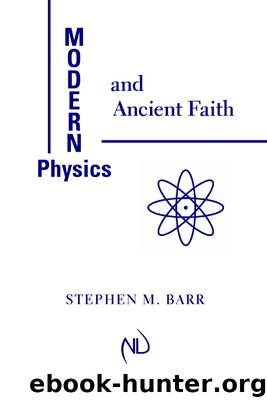Modern Physics and Ancient Faith by Barr Stephen M.;

Author:Barr, Stephen M.; [Barr, Stephen M.]
Language: eng
Format: epub
Tags: SCI055000
ISBN: 4454332
Publisher: University of Notre Dame Press
Published: 2013-01-25T05:00:00+00:00
HOW OLD MUST A UNIVERSE BE?
The universe is indeed very old. The current best estimate of its age is about 15 billion years. This is a long time in human terms, but it is not long compared to what is required for life to arise through evolution. In the first place, life as we know it requires complex chemistry, and most of the elements that are used in the chemistry of life were forged in the deep interiors of stars. In order to become available for life, these chemicals had to be released by the stars in which they were formed. This happened at the end of those stars’ lives, when they exploded as supernovas. Before biological evolution could even commence, then, the whole lifetime of a star, which is typically billions of years, had to elapse. The Sun, a later generation star, began its life about 10 billion years after the Big Bang.
The process of biological evolution, too, is very time-consuming. Evolution is not understood well enough to be able to say how long it must take in general. But we do know that on Earth it took billions of years to produce multi-celled creatures, and several hundreds of millions of years more to produce animals with complex brains.
Now, these are facts about our own universe. However, one can argue that in any universe which could evolve sentient life through natural processes the universe itself would have to last much longer than the lifetimes of individual creatures. In the first place, a sentient organism is necessarily a complex thing. Its brain must be composed of a large number of elementary parts. This is certainly so of the human brain, which contains about 100 billion neurons, each of which is itself an intricate structure. The brain of a sentient creature might be very different from a human brain, of course, but it can hardly be doubted that, in general, it would have to possess a huge number of parts. Consequently, if such a structure is to be built up by a gradual process of evolution, a great many steps are required. This, in turn, implies that many generations must unfold. One generation, therefore, must be a small part of the total age of the universe.
Download
This site does not store any files on its server. We only index and link to content provided by other sites. Please contact the content providers to delete copyright contents if any and email us, we'll remove relevant links or contents immediately.
The Lost Art of Listening by Michael P. Nichols(7485)
Why I Am Not A Calvinist by Dr. Peter S. Ruckman(4135)
The Rosicrucians by Christopher McIntosh(3506)
Wicca: a guide for the solitary practitioner by Scott Cunningham(3163)
Signature in the Cell: DNA and the Evidence for Intelligent Design by Stephen C. Meyer(3123)
Real Sex by Lauren F. Winner(3002)
The Holy Spirit by Billy Graham(2938)
To Light a Sacred Flame by Silver RavenWolf(2808)
The End of Faith by Sam Harris(2725)
The Gnostic Gospels by Pagels Elaine(2516)
Waking Up by Sam Harris(2448)
Nine Parts of Desire by Geraldine Brooks(2355)
Jesus by Paul Johnson(2349)
Devil, The by Almond Philip C(2323)
The God delusion by Richard Dawkins(2295)
Heavens on Earth by Michael Shermer(2272)
Kundalini by Gopi Krishna(2177)
Chosen by God by R. C. Sproul(2157)
The Nature of Consciousness by Rupert Spira(2086)
